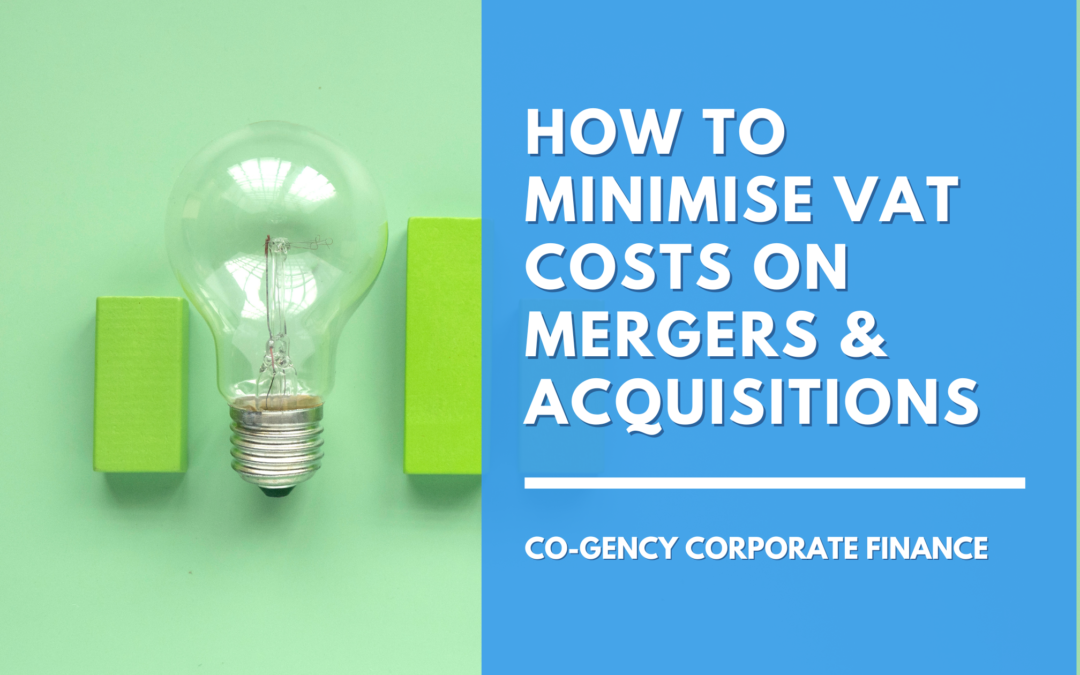When buying or selling a business, professional fees such as legal, corporate finance, and advisory costs can be substantial. If these fees include Value Added Tax (VAT) and you are unable to recover it, the additional 20% cost can significantly impact the overall transaction. Understanding how to structure your business to minimise or eliminate irrecoverable VAT is crucial in ensuring cost efficiency during mergers and acquisitions (M&A).
Understanding VAT on Professional Fees
VAT rules related to M&A transactions are complex and evolving. Whether VAT is applicable to professional fees depends on the nature of the service and how the transaction is structured.
When Is VAT Charged on M&A Fees?
Certain professional fees, such as corporate finance advisory services, may be fully or partially exempt from VAT, depending on the scope of the job and specific circumstances. However, some advisors apply VAT by default without considering potential exemptions. This means businesses may unnecessarily pay VAT, which can sometimes be corrected retrospectively.
To avoid overpaying, it is essential to work with advisors who understand the VAT treatment of different fees. Learn more about VAT exemptions.
How to Minimise or Recover VAT on M&A Transactions
1. Ensure Advisors Bill Correctly
Many businesses overpay VAT simply because their advisors do not assess whether an exemption applies. Before incurring costs, clarify the VAT status of professional fees and request a breakdown of charges. If VAT has already been applied incorrectly, you may be able to request a correction from your service provider. Understand VAT reclaim processes.
2. Structure Your Business for VAT Recovery
If your business is structured correctly in terms of VAT registrations and activities, you may be able to recover VAT on acquisitions, including prospective and aborted deals. However, this must be set up before incurring VAT to ensure eligibility.
A well-structured group can:
- Reclaim VAT on acquisition costs.
- Reduce exposure to irrecoverable VAT.
- Improve cash flow by optimising VAT treatment.
For guidance on structuring your business for VAT efficiency, consult with Cogency CF.
3. Consider the VAT Implications of Business Sales
If you are selling your business, understanding how VAT applies to your transaction is critical. The law around when VAT is charged by advisors and intermediaries in company sales is complex. Ensuring that professional services are billed in a VAT-efficient manner can significantly reduce unnecessary costs.
Additionally, some business disposals may qualify as a transfer of a going concern (TOGC), which could be exempt from VAT. Learn about TOGC rules.
4. Stay Compliant to Avoid Penalties
Given the large sums of VAT involved, failing to structure your transactions correctly can lead to substantial penalties. Non-compliance with VAT rules can result in unexpected tax liabilities and interest charges. Working with VAT specialists ensures your business remains fully compliant while taking advantage of available reliefs. Explore VAT compliance requirements.
Conclusion
VAT costs on mergers and acquisitions can be significant, but with proper planning, they can often be minimised or even eliminated. Key strategies include:
- Ensuring professional fees are correctly billed with VAT considerations in mind.
- Structuring your business to maximise VAT recovery on acquisitions.
- Understanding VAT exemptions and TOGC rules when selling a business.
- Staying compliant with evolving VAT regulations to avoid unnecessary penalties.
For expert advice on structuring your business for VAT efficiency in M&A transactions, consult with Cogency CF, specialists in corporate finance and transaction advisory services.
Note: VAT laws and regulations are subject to change. Always consult a VAT specialist or tax advisor for guidance tailored to your specific situation.

